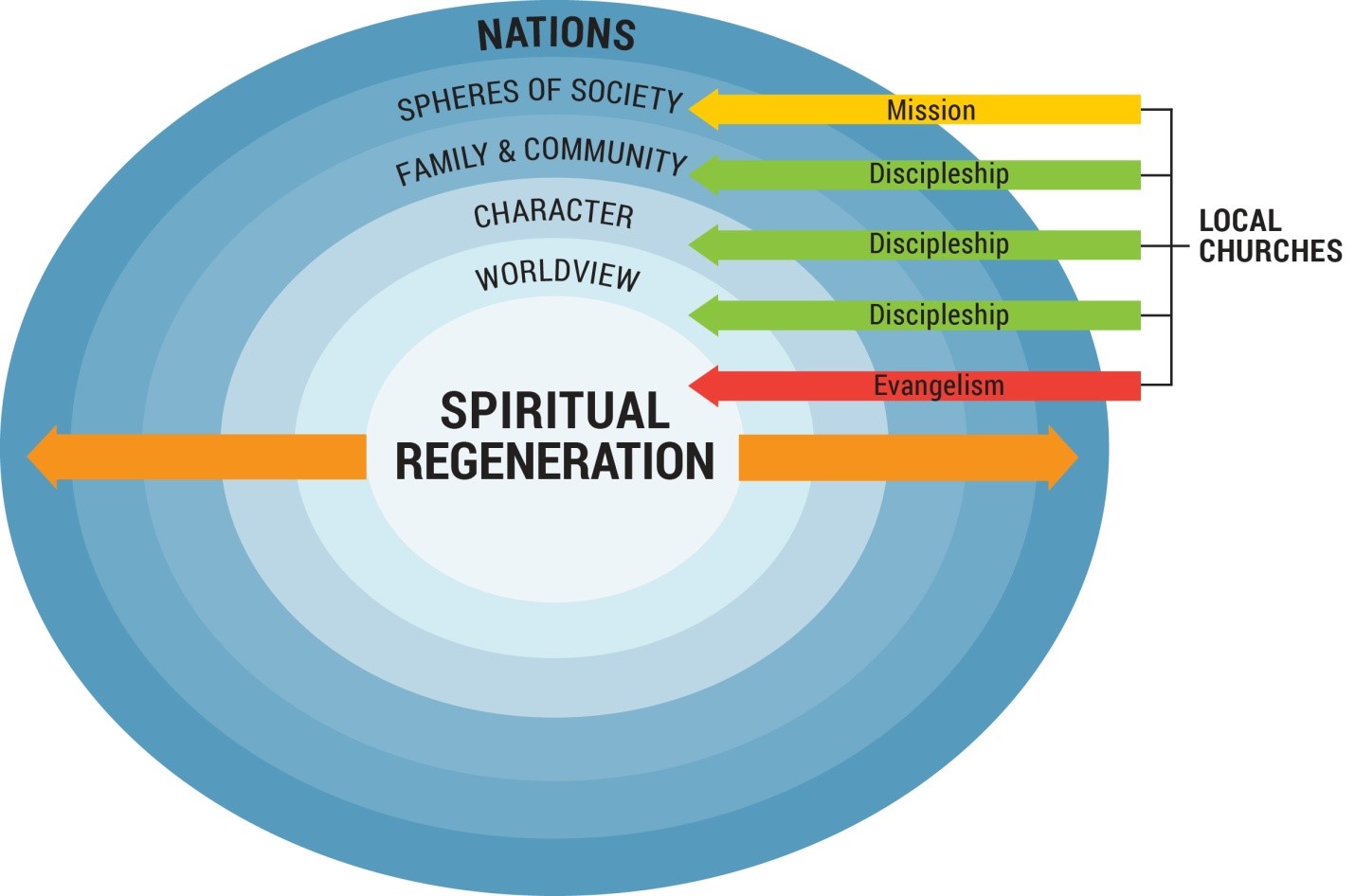Transformation is God’s ultimate aim in creation.
Yes, that includes people from every nation coming to a saving faith in Christ. It requires new churches being planted. Hungry people fed. These are all important, but they are not God’s ultimate aim. They should be viewed as essential “parts,” not ends.
God’s ultimate aim is that the knowledge of His glory would fill the earth as the waters cover the seas (Hab. 2:14). To be sure, this ultimate purpose won’t be fully realized until Christ returns. But until then, on the basis of His finished work on the cross, Jesus calls us to pray and to work, in His strength, to advance His Kingdom “on earth as it is in heaven” (Matthew 6:10). Not only does God have a comprehensive plan for creation, He has a strategy to advance it. It is an inside-out process of transformation with five specific, sequential steps.
The essential starting point in all lasting social transformation begins with spiritual regeneration at the level of human hearts and minds. Through the transforming power of the gospel, individuals are “born again” as “new creations” (John 3:3; 2 Cor. 5:17) filled with the Holy Spirit, enabled to do God’s will (Jer. 31:33, 34).
As people are born again, the transformational process continues through intentional training in Christ-likeness. Central to this training is discipleship at the level of worldview. New believers must be transformed by the renewing of their minds (Rom. 12:2). This transformation occurs as believers “take captive every thought to make it obedient to Christ” (2 Cor. 10:5).
Renewed hearts and minds lead naturally to changes in lifestyle and behavior. Character is renewed, biblical virtues take on bodily form, and the fruits of the Spirit (Gal. 5:22, 23) increasingly become a natural way of life.
From here, transformation begins to ripple outward into the social sphere. The first, most basic and most important social sphere is the family. As husband and wife pursue God’s way in marriage, they and their children are blessed. Such parents disciple their children to be the self-governing “godly offspring” that our Lord desires (Mal. 2:15). They carefully prepare them to exercise godly dominion in every part of the larger community.
In due time, as successive generations assume positions of influence in the various spheres of society, these areas are reformed and increasingly reflect God’s knowledge and righteousness. As this happens, the nation is blessed—the nation is discipled.
The local church and its leaders play an essential role in this process. They not only proclaim the good news of salvation in Christ, but they serve as “equipping centers” (Eph. 4:2). They equip singles for marriage, parents to be the primary disciplers of their children, and members of the body to advance God’s Kingdom in every area of society. The church also serves a prophetic role as the conscience of the nation.
A few important points need to be made about this inside-out process of social transformation. First, it doesn’t happen overnight! You may see little progress in your lifetime. Things may get worse before they get better, for we face stiff opposition. Our enemy, Satan, is busily advancing his counterfeit kingdom. He is planting his weeds in the midst of the wheat of God’s Kingdom, and the two grow side-by-side (Mat. 13:36-43). We can expect him to do everything in his power to oppose us yet, by the blood of Christ, we can resist him as we put on the full armor of God described in Eph. 6:10-18.
Second, the process begins by the supernatural work of God in regenerating human hearts and minds, and it advances by God’s grace and the work of His Spirit. He is the author of transformation, and while He uses individuals, families and churches, all of the credit, honor and glory for any positive change belong to Him alone.
Third, transformation is the work of God through generations, and this is why the family is so central to God’s plan, for it is a uniquely multi-generational institution. With the heart of the children won to their father and their father’s God, the cause of Christ in the world can go forward though the generations. Lastly, transformation at every level (individual, family and nation) is contingent upon transformation in the preceding level.
Puritan pastor Hugo Grotius (1583-1645) captured this insight when he said, “He who knows not how to rule a kingdom, that cannot manage a Province; nor can he wield a Province, that cannot order a City; nor he order a city, that knows not how to regulate a Village; nor he a Village, that cannot guide his family; not can that man Govern well a family that knows not how to govern himself.”
The Disciple Nations Alliance endorses this inside-out process of cultural transformation: the framework for all the teaching, training and equipping we provide to local churches around the world.
– Scott Allen






